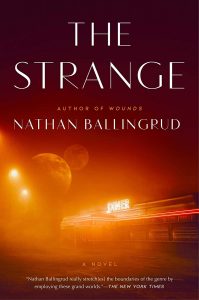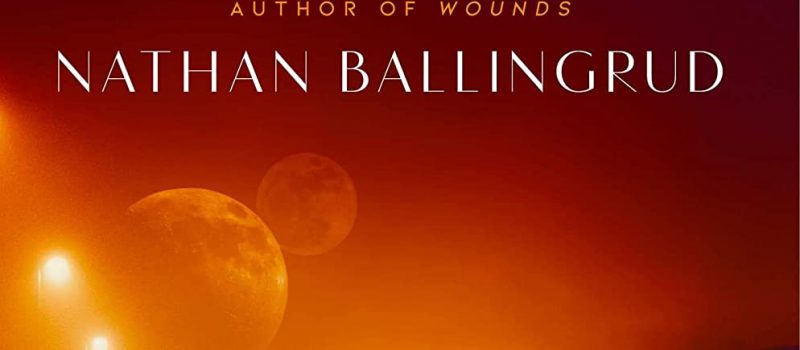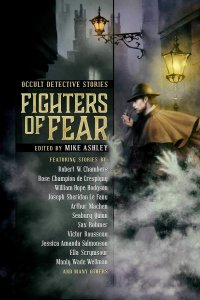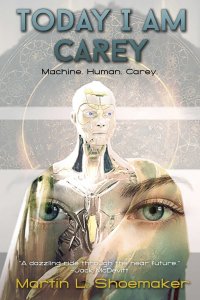Sean Dowie Reviews The Strange by Nathan Ballingrud
 The Strange, Nathan Ballingrud (Gallery 978-1-53444-995-4, 304pp, $27.99, hc) March 2023.
The Strange, Nathan Ballingrud (Gallery 978-1-53444-995-4, 304pp, $27.99, hc) March 2023.
Nathan Ballingrud’s debut novel The Strange takes place in a version of the 1930s where humans have inhabited Mars. It opens with teenager Anabelle and her father Sam working in their diner, living in a Martian town that is surrounded by arid nothingness, an isolation that is mirrored in the characters’ loneliness. When their diner is robbed by a group of men led by the sinister Silas, the robbers take a recording of Anabelle’s mother, who is Earthbound and cannot be contacted because of a mysterious phenomenon called The Silence. Pressure rises over the following days, and things spiral out of control when Sam is arrested for defending himself against miners, killing one of them. Anabelle and her docile Kitchen Engine/dishwasher/robot Watson then go on a journey with a gruff, ragtag group of acquaintances to find the recording in hopes that its audio will help keep both herself and Sam psychologically afloat and stable. But Mars isn’t a simple planet. There are many machinations from forces human, robotic, and things beyond either of those.
Gone are the times when Martian people shuttled back and forth from Mars to Earth. There might still be civilization on Earth, but there’s no way to know, and the only person with a ship and the skills to reach out is in a debilitating malaise. Meanwhile, a Martian substance called The Strange has an undefined purpose. One thing is certain about it, however: it affects the psychological makeup of those exposed to it. The personalities of people, and even robots, have become distorted – their once familiar personalities now ranging between the known and the aberrant. Our narrator Anabelle soon finds out that even those not infected by The Strange might be more affected than she had thought–her expectations of people are wholly different from who they now are. The Strange proposes the terrifying thought that our messages are always interpreted through a filter of malice and selfishness not readily apparent until people are at a point where they have nothing to lose. Here communications are always relayed to a source we don’t truly know, Silence or not, Mars or Earth, because people often put up a front primed to break down under pressure or greedy opportunity. And in The Strange, pressure rises, and opportunities are offered to the umpteenth degree. The result is an unmasking that spotlights each of Anabelle’s neighbors as they either take Annabelle’s vulnerability as an opportunity to help or to prey upon her, pillaging her supplies in the process.
The Strange wouldn’t be half as good without Ballingrud’s extraordinary characterization. Whether it’s Anabelle’s tenacity and immaturity as she goes through tribulations that would make most people falter in search of a recording that everyone around her thinks she overvalues. Or the calculated contradictions of Silas’s approachability and his self-serving attitude as he shifts from level-headed magnanimity to level-headed malevolence, modulating his personality to achieve his goals. Or Joe’s glimmers of love in overwhelming desolation–both in his surroundings and internality, soothing his pain with alcohol, wasted in a wasteland. My favorite character, however, is Sally, who starts out as an enigmatic antagonist but becomes coarsely caring, like a warm sandpaper blanket. These characters and more interact with each other to parcel out appropriately paced reveals and unearth things about each other in an impressively structured, endlessly engaging narrative.
Aspects of The Strange seem to be inspired by classic science fiction: Bradbury’s The Martian Chronicles and Burroughs’s A Princess of Mars spring to mind. It also takes inspiration from Westerns like True Grit, which feels apt. Underpinning it at times is a powerful darkness that is familiar from Ballingrud’s short fiction. But whatever inspired it, The Strange manages to find unique twists to the Martian subgenre, along with turning some outdated, unflattering social politics into something palatable. The novel’s descriptions of racial and Queer dynamics feel authentic to that time. Ballingrud manages to show us that time with a modern voice, self-aware of the bile associated with such a viewpoint without using the authorial voice to break the fourth wall and subvert immersion. But diversity is touched on only briefly. To its credit, it never feels crass and exploitative, yet never feels thorough. I was left wanting more in that regard.
In The Strange, Ballingrud manages to tell a story that inhabits the spirit of old-school SF and Westerns while making something of his own. The Strange carefully avoids the outdated sensibilities of the time in which it is set, while having rollicking narrative drive, engagement, philosophy, and unpredictability. But by inhabiting a beast as divisive in these times as old-school science fiction, you risk becoming affected by the thing you’ve entered. Poetic prose, thrilling storytelling, and excellent characterization – which all feel fresh and alive here – run the risk of mirroring the worst of the past. That happens in a few very, very slight instances here. Nevertheless, Ballingrud transitions from being the author of some of my favorite short fiction to writing a debut science fiction novel as well as I or any of his readers could’ve hoped. This splendid story should most definitely please fans of the genre and perhaps convert naysayers along the way. The narrative might be uneven, but I enjoyed it immensely.
Sean Dowie is a writer and editor living in Toronto, Canada. He’s an Assistant Editor at Augur Magazine, contributor at the fanzine Nerds of a Feather, and is on FIYAH Literary Magazine’s book reviewing team. When not obsessing over literary activities, he’s usually directing short films.
This review and more like it in the February 2023 issue of Locus.
 While you are here, please take a moment to support Locus with a one-time or recurring donation. We rely on reader donations to keep the magazine and site going, and would like to keep the site paywall free, but WE NEED YOUR FINANCIAL SUPPORT to continue quality coverage of the science fiction and fantasy field.
While you are here, please take a moment to support Locus with a one-time or recurring donation. We rely on reader donations to keep the magazine and site going, and would like to keep the site paywall free, but WE NEED YOUR FINANCIAL SUPPORT to continue quality coverage of the science fiction and fantasy field.
©Locus Magazine. Copyrighted material may not be republished without permission of LSFF.







